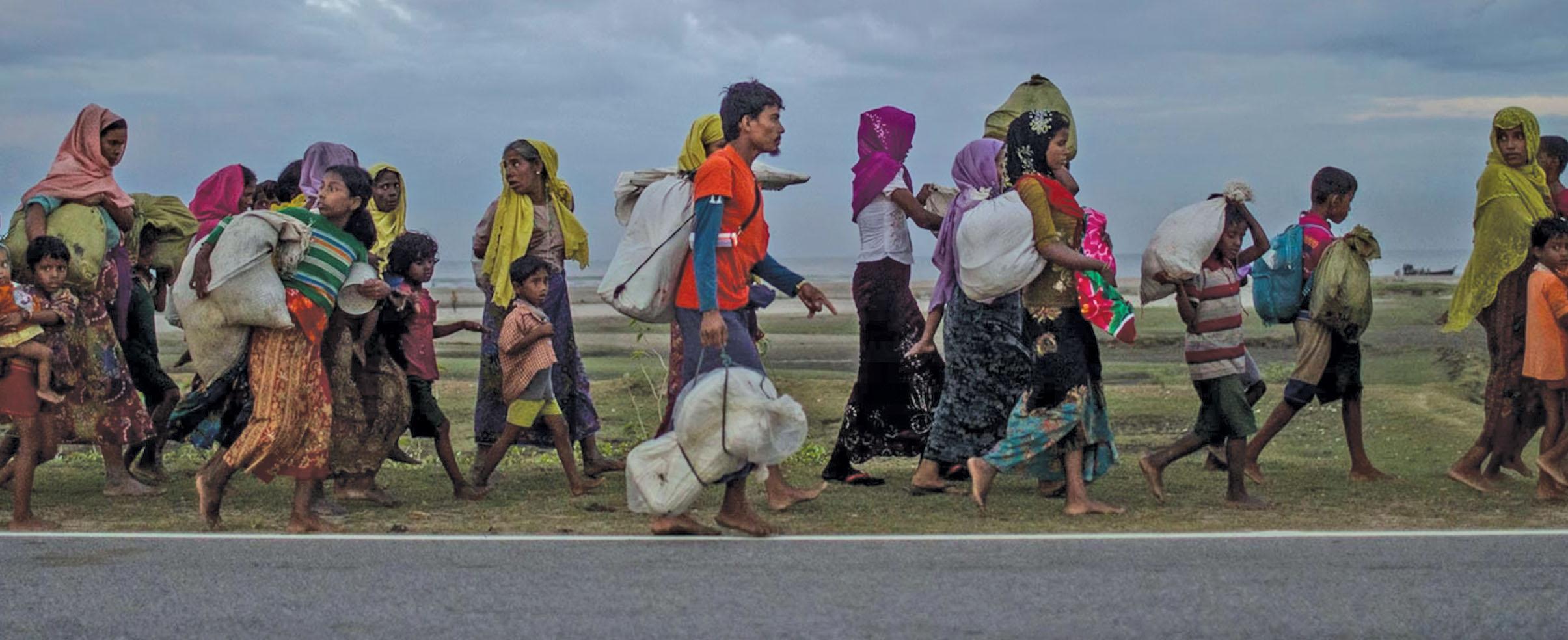Climate-Induced Migration: A Growing Crisis in South Asia
Extraordinary and Plenipotentiary Diplomatist
|February 2025
People have been migrating over the years for various reasons.

Background
An essential aspect of human history, there have been several factors responsible for migration that concern socioeconomic, political and environmental aspects. Migration has been influenced by trade, conquests, and resource shortages since the dawn of civilization in places like Mesopotamia, the Indus Valley, and the Nile Basin. As individuals relocated to urban areas in search of work and stability during the industrial era, economic and political migration took centre stage as the phenomena developed over time. The world’s cultural and demographic landscapes have been significantly shaped by the great migrations of the past, such as the Silk Road trades and the Indo-Aryan movements.
Migration can be divided into voluntary and forced movements, with the latter often driven by factors such as conflict or environmental degradation. Environmental migration occurs when individuals are forced to leave due to natural disasters or long-term climate change impacts. This issue is particularly pressing in South Asia, hometo 25% of the world’s population. Both sudden onset events and slow-onset changes are altering South Asia’s socio-economic landscape. As Bhatta and Aggarwal (2015) and Bhattacharyya and Werz (2012) highlight, environmental stressors are key determinants of migration patterns, compelling people to relocate in search of stability and security. While some displaced individuals eventually return to their homes, many face long-term resettlement challenges, often categorized as ‘distress migrations.’ In South Asia, climate change has caused significant internal displacement, with over 40 million people migrating to their countries due to climate-related factors. This represents about 1.8% of the population. Projections indicate that by 2050, more than 62 million people could be displaced if current trends persist.
Consequences of Climate-Induced Migration
This story is from the February 2025 edition of Extraordinary and Plenipotentiary Diplomatist.
Subscribe to Magzter GOLD to access thousands of curated premium stories, and 10,000+ magazines and newspapers.
Already a subscriber? Sign In
MORE STORIES FROM Extraordinary and Plenipotentiary Diplomatist

Extraordinary and Plenipotentiary Diplomatist
Kenya Tourism, Trade, Culture and Cuisine
Relations between Kenya and India date back several centuries, founded on historical maritime trade across the Indian Ocean and reinforced through shared experiences during the colonial and post-independence eras.
5 mins
November 2025

Extraordinary and Plenipotentiary Diplomatist
Taste, Travel & the Indian Experience: Reclaiming the Diplomacy of the Senses
\"Our similarities are way more than our differences. And our differences are just there to keep things interesting.\"
5 mins
November 2025

Extraordinary and Plenipotentiary Diplomatist
Chile A Land of Poetry, Peace, and the Living Arts
Stretching gracefully between the Pacific Ocean and the mighty Andes mountain range, Chile is a nation that seems to hold the world's extremes: the driest desert in the north, glaciers in the south, and fertile valleys and vineyards in between. Yet beyond its natural wonders lies another richness: a deep and enduring love for art, poetry, and beauty.
3 mins
November 2025
Extraordinary and Plenipotentiary Diplomatist
"Visit Malaysia 2026 – Surreal Experience: where every moment feels like coming home”
In this exclusive conversation with Diplomatist Magazine, Mr. Ahmad Johanif Mohd Ali, Director of Tourism Malaysia, reflects on Malaysia's evolving tourism vision. He shares how Malaysia is shifting from destination-based promotion to immersive, people-centred storytelling that speaks to today's Indian traveller. He highlights the growing potential of niche segments such as destination weddings and golf tourism, the impact of visa-free entry, and the importance of strengthening air connectivity and regional partnerships within ASEAN. Emphasising responsible tourism, community engagement, and cultural exchange, Mr. Johanif positions Malaysia not just as a place to visit, but as a heartfelt experience rooted in warmth, belonging, and shared heritage.
6 mins
November 2025

Extraordinary and Plenipotentiary Diplomatist
The Light That Endures
Artist: Samia Israt Ronee - Across these five works — “Ode to Freedom,” “The Spring Bough,” “Conversation,” “Padma, Unbound,” and “The House of Tango” — the artist explores the quiet dialogues between nature, memory, and emotion.
2 mins
November 2025

Extraordinary and Plenipotentiary Diplomatist
Diaspora Diplomacy - A View from Gujarat
I joined the British Diplomatic Service 23 years ago. Many things have changed in that time. But one thing has remained constant: the diplomat's penchant for sloganeering and jumping on the latest bandwagon.
3 mins
November 2025

Extraordinary and Plenipotentiary Diplomatist
Tractors, Technology, and Transformation
In a candid conversation with Diplomatist Magazine, Mr. Rajiv Wahi, CEO of International Business, Captain Agri Machinery Exim LLP, articulates his ambitious blueprint for repositioning India's agri-machinery sector on the global stage. Charting his trajectory from automobiles and construction equipment to smallholder-centric agricultural mechanisation, Mr. Wahi unpacks the untapped potential of the compact tractor segment, the intricate hurdles of penetrating emerging markets, and the indispensable value of strategic partnerships and ecosystem innovation. With a lens on ingenuity, localisation, and the evolving contours of international agricultural engagement, he presents a visionary roadmap for 2035: elevating India to a leadership role in sub-50 HP tractors, exporting not merely equipment but empowerment, resilience, and sustainable impact.
4 mins
November 2025

Extraordinary and Plenipotentiary Diplomatist
Reimagining Europe's Global Role: A Conversation with Prof. Nathalie Tocci
In an informative exchange with Diplomatist, Professor Nathalie Tocci, Director of the Istituto Affari Internazionali and Professor of Practice at Johns Hopkins University SAIS Europe, reflects on Europe's evolving strategic identity in a world marked by shifting power equations and the growing resonance of the Global South. From the EU's pursuit of strategic autonomy and climate diplomacy to the urgent need for reforming multilateral institutions, Tocci offers a sharp, forward-looking perspective on how Europe must redefine its global role—balancing principles with pragmatism. She also shares her insights on the emerging contours of India—EU cooperation, the rise of multipolarity, and the role of think-tanks in navigating disruption and disinformation.
4 mins
November 2025

Extraordinary and Plenipotentiary Diplomatist
YOUTH-LED DIPLOMACY - The Rise of Young Voices in India's Multilateral Engagement
Twenty-first-century diplomacy is witnessing a quiet revolution that marks a decisive shift in global governance. For India, which has set its sights on becoming a “Vishwaguru by 2047”, the empowerment of its massive youth demographic is a diplomatic imperative apart from the social goal.
4 mins
November 2025

Extraordinary and Plenipotentiary Diplomatist
The Timeless Charm of Romania
Romania is not a postcard from the past but a country perpetually in dialogue with its own history where myth informs modernity, and where every festival, song, and stitch still hums with the timeless refrain of belonging.
3 mins
November 2025
Listen
Translate
Change font size

